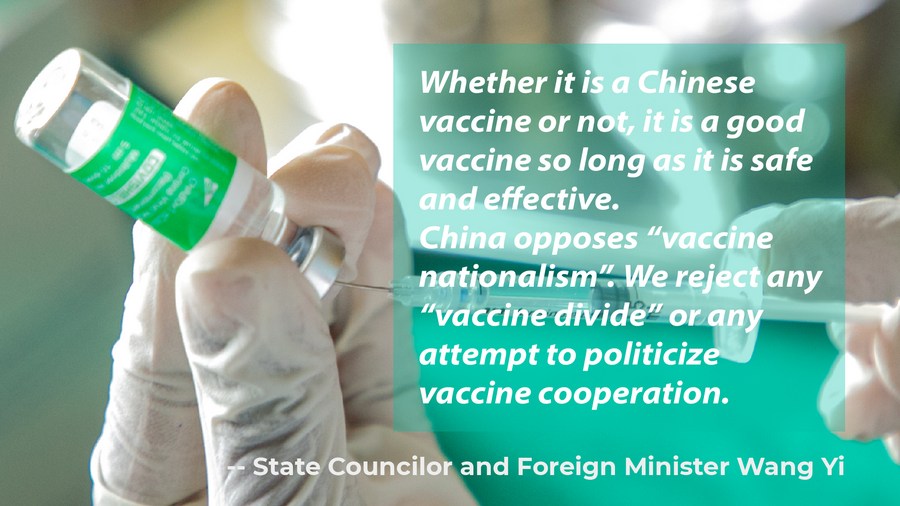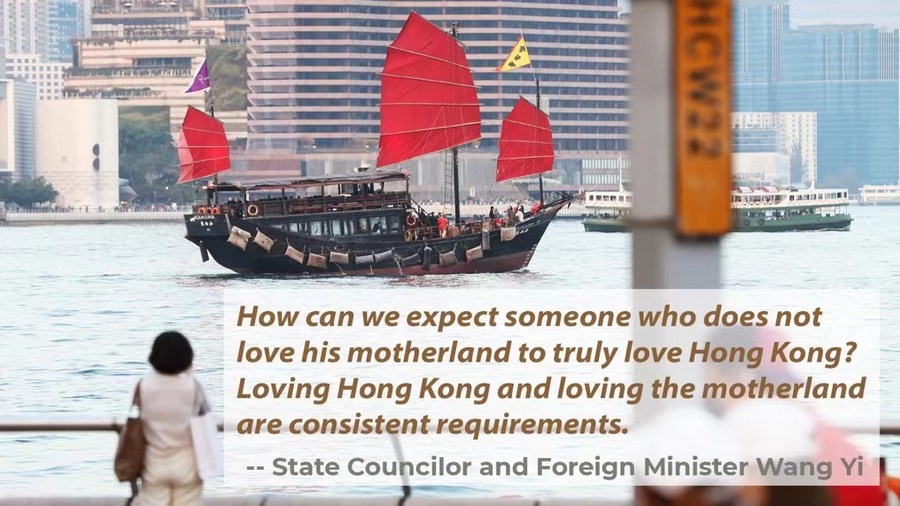China proposes "people's vaccines," healthy competition with U.S. amid rising gl
-- "China opposes 'vaccine nationalism'," said Chinese State Councilor and Foreign Minister Wang Yi. "We reject any 'vaccine divide' or any attempt to politicize vaccine cooperation."
-- China is ready to work with the United States to return bilateral relations to the right track of healthy and steady growth.
-- Slamming the Xinjiang genocide accusation as a "thorough lie" and a rumor fabricated with ulterior motives, Wang justified his comments with concrete figures.
China on Sunday proposed making the COVID-19 vaccines truly affordable and accessible for humanity as well as a healthy competition between the world's top two economies, injecting fresh certainties into the turbulent world.
The messages came as the long-lasting pandemic and the rising headwinds of protectionism are battering the already-fragile global economy in the midst of major changes unseen in a century.
"People's vaccines"
The only major economy that registered positive growth in 2020 worldwide, China has carried out its largest emergency humanitarian operation since 1949, honoring its commitment to making Chinese COVID-19 vaccines a "global public good."
It has provided and is providing the vaccine aid free of charge to 69 developing countries in urgent need, while exporting vaccines to 43 countries, according to Wang.
He said his country plans to set up vaccination stations abroad to administer Chinese vaccines for compatriots in need from surrounding countries, and stands ready to work with the International Olympic Committee to provide vaccines to Olympians.
China will continue working with others in unremitting efforts to completely defeat the pandemic that has claimed more than 2 million lives around the world, Wang pledged.

"China opposes 'vaccine nationalism'," said the senior diplomat. "We reject any 'vaccine divide' or any attempt to politicize vaccine cooperation.""China hopes that all members of the international community can work together and let the torch of multilateralism light up humanity's way forward," Chinese State Councilor and Foreign Minister Wang Yi told a press conference on the sidelines of the country's ongoing annual "two sessions."
Healthy competition, no systemic rivals
China and Russia standing together will remain a pillar of world peace and stability, Wang told the press conference, adding that the two neighbors should be each other's strategic support, development opportunity, and global partner.
On the Sino-U.S. ties that is at a critical crossroads, Wang noted that China is ready to work with the United States to return the bilateral relations to the right track of healthy and steady growth.
"China hopes that the United States will meet China half way and remove all its unreasonable restrictions on bilateral cooperation as early as possible," he said, adding that they could cooperate in areas such as the pandemic response, economic recovery and climate change.
China hopes that the new U.S. administration will make a "clear departure" from its predecessor's "dangerous practice" on Taiwan, he said, warning that the one-China principle is a "red line" that must not be crossed.
China and Europe share extensive common interests and are not systemic rivals, Wang said.
"Differences in systems should not be an excuse for antagonism and confrontation," he noted.
On the Sino-Japan relations, Wang said they should remain focused without being distracted by any single event to make the bilateral relations more mature and stable.
Xinjiang, HONG KONG
Slamming the Xinjiang genocide accusation as a "thorough lie" and a rumor fabricated with ulterior motives, Wang justified his comments with concrete figures.
The Uygur population in China's Xinjiang has doubled from 5.55 million to over 12 million in the past 40-plus years and the gross domestic product in the northwestern Chinese autonomous region has surged by more than 200 times over the past 60-plus years.
"Speaking of genocide, many people would have in their minds the native American of the 16th century, African slaves of the 19th century, the Jewish people of the 20th century, and the aboriginal Australians who are still struggling even today," he told the press conference.
The Chinese foreign minister also took a question on Hong Kong as the country's top legislature is mulling a draft decision to improve the electoral system of the Hong Kong Special Administrative Region (HKSAR) in accordance with the Constitution and the HKSAR Basic Law.

He said that the move to improve Hong Kong's electoral system and ensure "patriots administering Hong Kong" is "totally constitutional, lawful and justified," and will "usher in a brighter future" for the region.
Wang also responded to questions on regional hotspot issues including the situation in Myanmar, saying China stands ready to play a constructive role in easing the tensions in the neighboring country.
The immediate priority for Myanmar is to prevent further bloodshed and conflict, and ease and cool down the situation as soon as possible, Wang said.